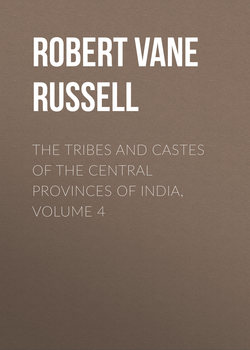Читать книгу The Tribes and Castes of the Central Provinces of India, Volume 4 - Robert Vane Russell - Страница 65
Part II
Articles on Castes and Tribes
Kumhār—Yemkala
Vol. IV
Kurmi
26. Shaving, and presents to Brahmans
ОглавлениеOn the ninth, tenth or eleventh day the males of the family have the front of the head from the crown, and the beard and moustaches, shaved in token of mourning. The Mahā-Brāhman who receives the gifts for the dead is shaved with them. This must be done for an elder relation, but a man need not be shaved on the death of his wife, sister or children. The day is the end of mourning and is called Gauri Ganesh, Gauri being Pārvati or the wife of Siva, and Ganesh the god of good fortune. On the occasion the family give to the Mahā-Brāhman68 a new cot and bedding with a cloth, an umbrella to shield the spirit from the sun’s rays, a copper vessel full of water to quench its thirst, a brass lamp to guide it on its journey, and if the family is well-to-do a horse and a cow, All these things are meant to be for the use of the dead man in the other world. It is also the Brāhman’s business to eat a quantity of cooked food, which will form the dead man’s food. It is of great spiritual importance to the dead man’s soul that the Brāhman should finish the dish set before him, and if he does not do so the soul will fare badly. He takes advantage of this by stopping in the middle of the meal, saying that he has eaten all he is capable of and cannot go on, so that the relations have to give him large presents to induce him to finish the food. These Mahā-Brāhmans are utterly despised and looked down on by all other Brāhmans and by the community generally, and are sometimes made to live outside the village. The regular priest, the Malai or Purohit, can accept no gifts from the time of the death to the end of the period of mourning. Afterwards he also receives presents in money according to the means of his clients, which it is supposed will benefit the dead man’s soul in the next world; but no disgrace attaches to the acceptance of these.
68
He is also known as Katia or Kattaha Brāhman and as Mahāpātra.
